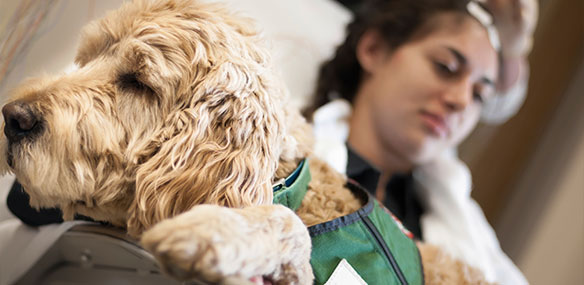Cancer treatment in the Sutter Health network goes beyond fighting cancer cells. We provide supportive services, including complementary therapies to help you maintain emotional strength, support groups, financial counseling and cancer rehabilitation services. Many people find help and healing through these support programs.
- Complementary Therapies — When used along side medical treatment, complementary therapies like art, photography, music and movement therapy help many people manage symptoms and reduce the side effects of cancer treatment. We offer dozens of complementary therapies and group classes to help you manage stress and strengthen your emotional self during treatment.
- Nurse Navigators — From day one of your cancer diagnosis, a Sutter nurse navigator can serve as a single point of contact to help you understand your condition, explore and prepare for treatments, maximize the recovery process, evaluate clinical trial opportunities and manage care-related financial issues.
- Survivorship Programs — These sessions can help you get back to doing the things you love, assist you in making healthy lifestyle choices, provide social support, and connect you with educational and community resources to improve and manage your long-term wellness.
- Nutrition Counseling — Get one-on-one coaching from a registered dietitian for education, assessment and care for nutrition-related conditions, such as gastrointestinal distress, heart disease, cancer, diabetes, eating disorders and weight management.
- Support Groups — Connect with like-minded patients and caregivers, including groups for breast and gynecological cancer patients, youth, families and caregivers, Spanish-speaking clients, and more.
- Children's Support — Children's Art Therapy Support groups, know as CATS, helps children and teens learn to cope with and accept a loved one's cancer diagnosis (or their own.) Specially certified therapy animals also make hospital visits to help decrease stress and anxiety in both kids and adults.
- Pain Relief — Depending on your type of cancer and treatment, you can consult with physical or speech therapists and others to help you manage pain and discomfort, boost your immune system and recover form and function.
- Lymphedema Program — Cancer treatments may cause lymph fluid buildup and swelling, known as lymphedema. Along with receiving specialized massage, you’ll learn how to independently monitor and manage lymphedema through thorough training in self-massage, compression, exercise and skin care.
- Physical Therapy — Exercise — even a small amount — can help you rebuild function, endurance and strength while decreasing anxiety and increasing a sense of hope and control. Your cancer care physical therapist can help maximize strength and mobility during and after cancer treatment.
Helpful Resources
















